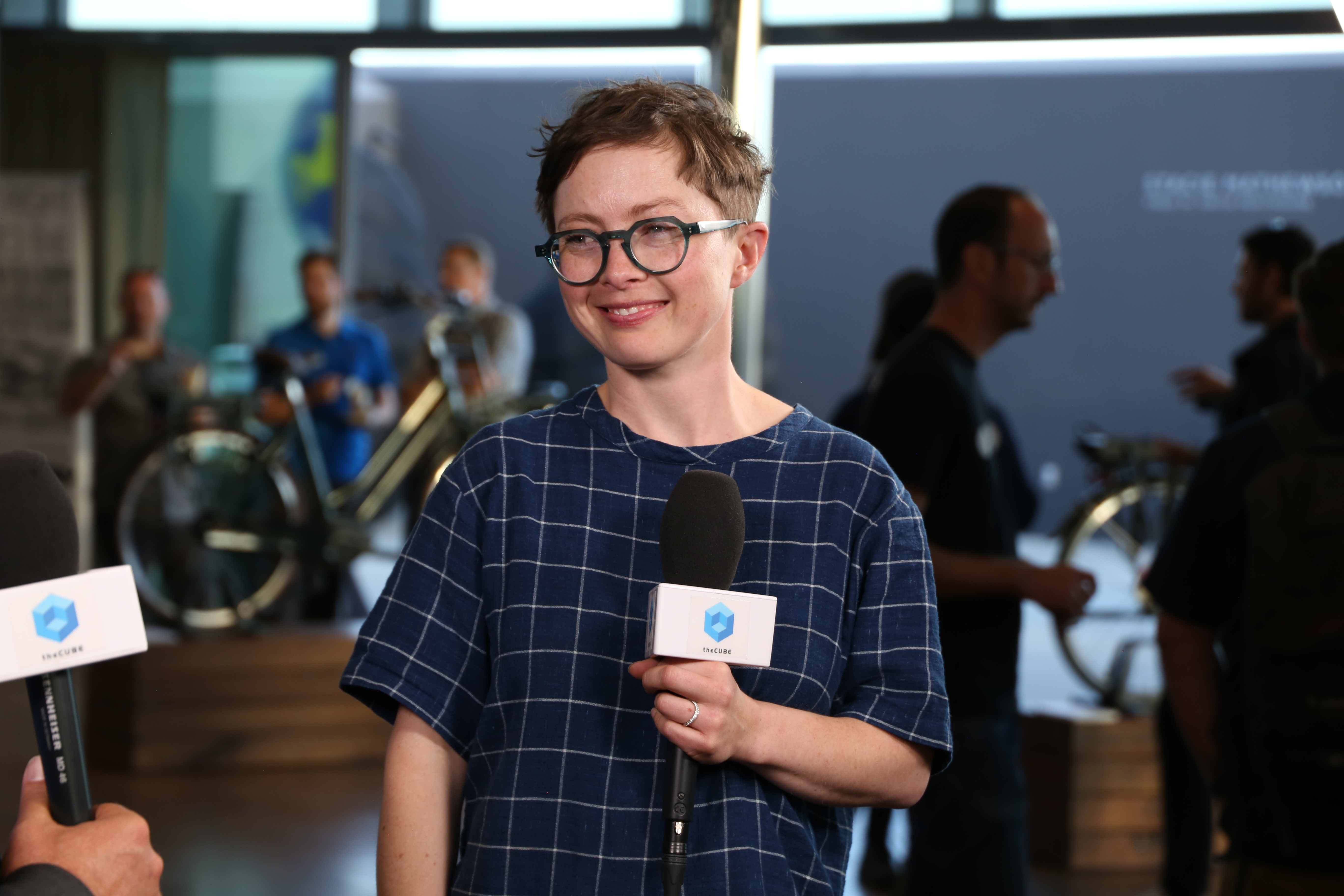 NEWS
NEWS
 NEWS
NEWS
 NEWS
NEWS
The new breed of e-bikes with lightweight lithium-ion batteries and speeds up to 28 miles per hour are eliciting different questions from consumers, startups and cities: Are they all-around better than regular bikes? Are they fit for both commuting and sports biking? Will they replace cars?
Lighter, cleaner batteries are spurring the uptick in e-biking in the U.S. as well as Europe, where it’s already huge, according to Karen Wiener (pictured), co-founder of The New Wheel Inc.
“Battery technology that originated in laptops and now is being used in cars and autonomous vehicles totally changed the potential for electric bikes,” Wiener said. “About eight years ago manufacturers switched from very heavy, very polluting batteries to lithium ion types. And it means that you can have a bicycle that you can lift, that weighs between maybe 35 and 60 pounds, that will take you anywhere from 25 to 100 miles. That’s a game changer.”
Right now, the main advantage a battery offers is the pedal assist that makes riding an e-bike feel anywhere from a bit easier than naked pedaling to “like floating,” according to riders. E-bike makers continue to discover new ways these batteries can enable advanced features. Anti-theft devices and heart-rate trackers are some features Wiener sees coming down the pipeline. And thanks to a growing body of laws making regulation clearer and collaboration between startups and municipalities, there looks to be a broad fleet of e-bikes wheeling into view.
Wiener spoke with Jeff Frick, host of theCUBE, SiliconANGLE Media’s mobile livestreaming studio, during the InterBike Marketweek event in Reno, Nevada. They discussed how The New Wheel formed in San Francisco and why cyclists switch to e-bikes.
This week, theCUBE spotlights Karen Wiener in its new Startup of the Week feature.
Wiener began selling electric bikes out of her San Francisco apartment in 2010; thus The New Wheel was born. She knew about e-bikes’ popularity overseas and was amazed that American manufacturers were leaving the U.S. market largely untapped.
“We realized that, gosh, San Francisco is the perfect place,” she said.
Electric bikes amplify pedaling power. They feel a lot like regular bikes do when a rider is in the best possible shape on the best possible day, Wiener described. The extra oomph is a godsend for mounting San Francisco’s notorious hills.
“We had a mobile shop that we would ride from farmers market to farmers market,” she said. “Then we opened our first store in 2012.”
Today, the company runs stores in San Francisco and Marin County in addition to its website. “We focus on curating high-quality electric bikes that are going to work really well in San Francisco, which, as you know, is really rugged, especially in terms of elevation-gain environment,” she added.
That oomph can range from a modest assist to a boost that can make rough-terrain mountain biking feel like a ride down the sidewalk. “I talk with a fair amount of people in the bike industry, and my understanding is that lots of the growth in mountain biking is coming from the e-bike,” said Orion O’Neill, sales manager at Future Motion Inc., who spoke to theCUBE during the InterBike event. Future Motion manufactures a single-wheeled, electric skateboard popular in the last-mile transportation market.
Europe has been ahead of the U.S. in e-biking and biking generally for years. Bike commuting is so popular in Europe that the Netherlands has an 11-mile highway just for cyclists, called RijnWaalpad. E-bikes that demand less physical exertion, along with startups that make grabbing a bike on the go almost as easy as hailing an Uber, might help Americans catch up.
Uber Technologies Inc. began offering customers access to Jump Bikes Inc. through its app last February and officially acquired it in April. Through the mobile app, users receive a PIN to unlock a nearby electric bicycle. The big leap for Jump and similar startups is that the e-bike is dockless, meaning users can pickup and drop off bikes just about anywhere there’s something to which they can secure them. Numbers released in July showed that since Uber made bikes an option, their use rose 15 percent while car trips declined by 10 percent.
When commuters choose bikes over cars, it can have big benefits for the environment and for drivers on long trips who don’t have to share the road with people on a five-minute drive to Trader Joe’s.
“During rush hour, it is very inefficient for a one-ton hulk of metal to take one person 10 blocks,” Uber Chief Executive Officer Dara Khosrowshahi told the Financial Times. “We’re able to shape behavior in a way that’s a win for the user. It’s a win for the city. Short-term financially, maybe it’s not a win for us, but strategically long-term we think that is exactly where we want to head.”
Cities such as Seattle have bike-sharing programs in full gear, and others are following suit. It used to cost cities tons of taxpayer dollars, to the tune of $5,000 per bike, to implement a program. Now, through a permitting process, they can get startups to furnish and service the bikes.
“This is the moment everyone in the industry has been hoping for,” Nick Foley, head of product at Social Bicycles, which operates Jump, told CNN last year.
For those in the market for personal ownership, The New Wheel offers e-bikes ranging from roughly $2,000 to $8,000.
“People love their bikes,” Wiener said. “What surprises them I think most most often is just how many miles they’re accruing on their odometer. We all live with a lot of stress and a lot of multitasking. And taking 20 minutes on your bike and just having a great relaxing time is unbeatable.”
Here’s the complete video interview, part of SiliconANGLE’s and theCUBE’s coverage of the InterBike Marketweek event:
THANK YOU